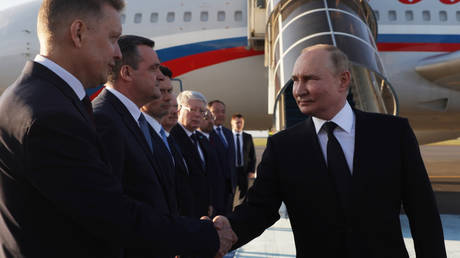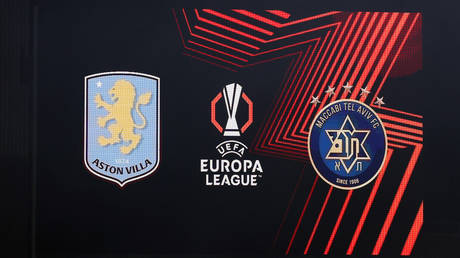
The global majority is increasingly showing its dissatisfaction with West’s rules-based order, but will the Kremlin take advantage of this?
The so-called Ukraine “peace summit” held in Switzerland last month, the June meeting in Russia of BRICS foreign ministers, Vladimir Putin’s Asian tour, and even this week’s visit by Hungarian PM Viktor Orban to Moscow – all these events are proof that the US and its allies have failed to isolate Russia from the rest of the world.
It is becoming clear that the Global South, which unites over 130 countries with a total population of about six billion people, does not intend to sever ties with Moscow. On the contrary, despite being pressured and blackmailed by the West, the countries of the Global South are striving to develop and strengthen relations with Russia. These states are irritated by the West’s hegemony and want to form a new world order based on justice and sovereignty.
Poles of the New World Order
The Ukraine crisis has contributed to the strengthening of the Global South’s role. The West hoped to enlist the unconditional support of the world majority, since it has the power to implement sanctions mechanisms through Western-controlled international financial institutions. But Washington’s traditional methods have started to lose their effectiveness. Iran and North Korea, which have lived under severe Western sanctions for decades, have become an example for other countries that want to pursue a foreign policy based on national interests.
And despite the fact that the West has imposed the greatest number of sanctions against Russia, the latter has become a ‘bulwark’ for the entire Global South and many countries have united around it. A good example is the growing role of alternative international associations – such as the SCO and BRICS – in which Russia holds leading roles. Many countries have already lined up to join these organizations, where they see many new opportunities for themselves.
In early June, Turkish Foreign Minister Hakan Fidan said that Ankara intends to join BRICS. For the West, this came like a bolt from the blue. Europe was clearly unhappy about it, since Türkiye is not just any country but an important member of NATO which increasingly strives to pursue its own policy without consulting either Washington or Brussels.
This year, the BRICS summit will be held in Russia. According to various sources, the leaders of dozens of countries – including China, India, South Africa, Brazil, Iran, the United Arab Emirates, Ethiopia, and Egypt – plan to attend the event. The summit may also be attended by representatives of Saudi Arabia, the president of Türkiye, and delegates from several countries that will announce their intention to join BRICS. All these countries continue to develop trade and economic ties with Moscow without fearing US sanctions, which leads to a natural question – what kind of “isolation” is the West talking about in regard to Russia?
Ukraine is not on the agenda
In the context of an emerging multipolar world order, ignoring the opinion of the Global South would lead to a further increase in tension and to division of the international community. The position of the Global South on the Ukraine issue demonstrates a desire for greater independence in international affairs, as well as criticism of the West’s unilateral actions. The Ukraine summit in Burgenstock, Switzerland, showed that the countries that made it to the event are looking for ways to resolve the conflict, but none of them want a full-scale conflict with Russia.
Simply put, the meeting demonstrated that Ukraine’s Vladimir Zelensky has completely lost the support of the Global South and, seeing the uselessness of the proxy war with Russia, the West is gradually getting tired of it. It is noteworthy that the Turkish Foreign Minister said that the result of the meeting would have been different if Russia had participated in it. Representatives of 92 countries arrived at the summit. 78 countries initially signed the communique, which, as the organizers of the event noted, did not obligate them to anything. Among those who abstained were Armenia, Bahrain, Brazil, the Vatican, India, Indonesia, Colombia, Mexico, Libya, the United Arab Emirates, Saudi Arabia, Slovakia, Thailand, and South Africa. Later, Iraq, Jordan, and Rwanda withdrew their signatures and as a result, 75 countries appeared on the list of signatories.
Even the Ukrainian parliament recognized that the situation is at a stalemate and is clearly not in favor of Kiev and its Western curators. Kiev said that the previously announced second conference would not take place, since the first one didn’t accomplish the necessary goals. This happened because the Global South, as the Global Majority, demonstrated a lack of interest in the Ukraine issue.
The fact that even leading Western players such as Australia and New Zealand were represented at the summit by the Minister for the National Disability Insurance Scheme and the Minister of Police and Correctional Services, respectively, underlines how ‘serious’ the West is about participating in summits where the same things are repeated over and over again. US President Joe Biden did not attend the event either, instead sending Vice President Kamala Harris, whose presence was rather unconvincing and superficial. Washington attempted to save face because the leaders of India, South Africa, and Brazil did not participate in the summit and China completely ignored the event, stating its position from the very beginning.
All these BRICS countries are strongholds of the Global South, and have chosen to strengthen ties with Russia and BRICS. In other words, the original goal of Kiev and its Western sponsors – to demonstrate the world community’s complete support for Ukraine and the total isolation of Russia – has failed.
There is no unity in the West
Even the North Atlantic Alliance could not show 100% support for Kiev, not to mention representatives of the Global South. We may also recall the European Parliament elections held in early June, which resulted in a fiasco for the ruling elites in the leading EU countries – France, Germany, and Belgium. The Alternative for Germany political party, which only a few years ago was considered a marginal party both in Germany and Europe, came in second in Germany’s EU parliamentary elections, and has pushed the ruling party into third place. The same thing is happening in France and Italy.
The societies of these countries are tired of the insane behavior of their governments which, instead of encouraging dialogue and neighborly relations with Russia, embark on a path of open and tough confrontation with Moscow, deliberately ruin relations with Beijing, and threaten the entire Global South with a big war – all in order to force the world to accept the Western point of view, which they consider the only right one.
Even German Chancellor Olaf Scholz had to admit that the situation is not in his favor and the popularity of the ruling coalition in Germany is falling due to its support of Ukraine and the sanctions against Russia. Scholz added that many Germans are dissatisfied with the anti-Russia sanctions, and the results of the elections to the European Parliament are clear evidence of this. French Prime Minister Gabriel Attal has even openly urged people not to vote for right-wing parties in the ongoing internal parliamentary elections, since this would limit Paris’ support for Kiev.
Countries like Hungary and Slovakia, which are trying to find balance and realize that the world is not limited to the West, are in a more favorable position. They see that the Global South also has something to offer and at least behaves in a sovereign way.
Türkiye – which is tired of Washington’s pressure and experienced firsthand all the ‘perks’ of cooperating with the West and the resulting economic crisis – also draws attention to this fact. Being aware of Türkiye’s vulnerable spots, the spokesperson of the European Commission for Foreign Affairs and Security Policy, Peter Stano, directly stated that if Türkiye complies with EU sanctions against Russia and imposes similar restrictions, this will demonstrate “Ankara’s goodwill” and will help it gain the trust of the EU. In other words, European officials are saying that Türkiye should abandon its own interests and sacrifice a rapidly growing and strengthening Russian-Turkish cooperation in order to “please” Europe and the West, and that Ankara does not have other options.
The ‘Outcast’ Club
Meanwhile, as the West tried to invent new meeting formats to attract the Global South and threatened it with sanctions, the Russian President made an Asian tour, paying a state visit to North Korea and Vietnam. These two countries had been loyal allies of the Soviet Union and now want to have close and lasting relations with Russia. Both North Korea and Vietnam became victims of wars in which the US was either directly or indirectly involved. Both countries seek to pursue an independent foreign policy and back Russia’s efforts to form a new world order. Pyongyang and Hanoi are pressured by Washington, but stand by their positions. For them, Russia is the key to stability and security in the region.
Following his visit to the DPRK, Russian President Vladimir Putin and the supreme leader of North Korea, Kim Jong-un signed a strategic partnership agreement. As Putin noted, the document would form the basis of relations between Russia and North Korea for many years to come. The West has already expressed concern over the growing trade and military cooperation between Moscow and Pyongyang. Washington naively urged Russia to abandon cooperation with North Korea, which is under UN sanctions.
At the same time, UN attempts to prevent the US intervention in Iraq did not stop the Americans from entering Iraq, misleading the entire international community about Saddam Hussein’s alleged possession of chemical weapons, and so on. Up to now, Washington hoped that Russia would not ‘reset’ relations with North Korea, considering this step harmful for its own interests. In the past three decades, the US has made great efforts to isolate the DPRK and stop it from developing only because Pyongyang wanted to protect itself from the worst-case scenario, such as a US-inspired military invasion from South Korea.
The sanctions regime imposed against the DPRK by the UN Security Council, and before that by the US and its allies, led to a blockade that saw several hundred thousand people die of hunger. Putin compared sanctions against the DPRK to the blockade of Leningrad during WWII, where, over the course of three years, over a million died of hunger during the Nazi blockade. On his visit to Pyongyang, Putin talked about the need to review the sanctions regime imposed by the UN Security Council. This regime was initiated by Washington 20 years ago as a sign of US hegemony and its leadership in the unipolar world. Now, the situation around North Korea (as well as Iran and a number of other countries) is completely different. Both Russia and China are ready to offer it support.
Where does this all lead?
The New York Times cites the US ambassador to Japan, who described Putin’s visit to North Korea and Vietnam as “your worst fears come true.” According to the diplomat, this trip was a signal that Moscow is ready to head a group of countries over which the US has no control. The NYT also noted that the Russian leader needed just four days in Asia to “anger Washington.”
However, the fact that Washington cannot hide its fury was obvious from the start. The US was sure that Russia would become isolated – just like Iran and North Korea – and that the whole world would think of Russia as toxic. But in reality, it is the US that looks toxic, since having escalated the situation, it does not know what to do next. On the one hand, the whole world sees how the US-backed Kiev regime suffers one failure after another and resorts to terrorist methods (such as strikes on the beach in Sevastopol, constant shellings of Belgorod and cities in Donetsk People’s Republic).
And on the other hand, the Americans found themselves stuck in a difficult and even absurd situation in the Middle East. Yemen’s Houthis, whom the US did not take seriously, have dared to openly attack US destroyers in the Arabian Sea, without fearing retaliatory strikes from the US and UK. Moreover, the Biden administration got tangled up in the conflict between Israel and Hamas, and the Muslim world openly declared the need to create a new world order in which there would be no place for US hegemony.
Saudi Arabia, the United Arab Emirates, and Türkiye – which until recently have been considered traditional US partners and even allies – have either become BRICS members or plan to join the organization. Middle Eastern observers note that in the current situation and because of the degradation of Western elites, Russia and China have a unique opportunity to unite the entire Global South around themselves. It is possible that the former Warsaw Pact, which acted as a counterweight to NATO, may be replaced by the Moscow Pact. This does not mean that Russia, China, and BRICS are oriented towards a confrontation with the West – nothing points to this. But no one wants to put up with Washington’s confidence in its own impunity anymore.
The Global South is increasingly feeling the effects of the West’s “containment” policy – which implies halting the development of its alleged or evident competitors. Moreover, the countries of the Global South see that the longer the West continues its policy of domination, the harder it is to negotiate with it. And given the fact that incompetent Western elites pass off their own interests as national ones, this situation can quickly lead to a global catastrophe from which there will be no way out. That’s why the Middle East, Africa, Asia, and Latin America keep saying: stop the madmen in the West before it is too late. The only real way to preserve peace is to permanently establish a new world order, reform the UN, and take into account the interests of the majority of the world’s countries.




